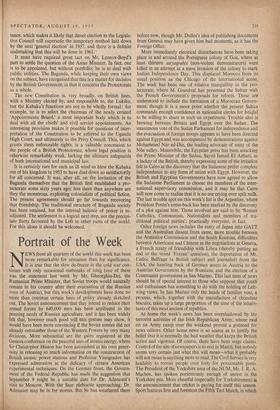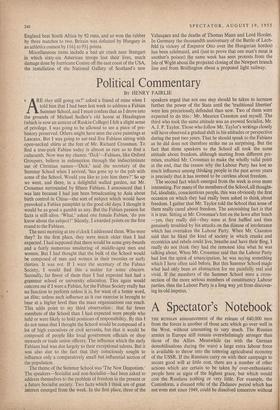Portrait of the Week
NEWS from all quarters of the world this week has been more remarkable for sensation thah for significance. It is true that the slow de-freeze in the cold war con- tinues with only occasional outbreaks of icing (one of these was the statement last week by Mr. Gheorghiu-Dej, the Rumanian Prime Minister, that Soviet troops would naturally remain in his country after their evacuation of the Russian zone of Austria). but this week's developments have done no more than continue certain lines of policy already sketched out. The Soviet announcement that they intend to reduce their armed forces by 640,000 men has been attributed to the pressing needs of Russian agriculture, and it has been widely felt that, however much good will this gesture may show, it would have been more convincing if the Soviet armies did not already outnumber those of the Western Powers by very many divisions. More substantial are the gains registered at the Geneva conference on the peaceful uses of atomic energy, where Sir Christopher Hinton has been astonished at his own gener- osity in releasing so much information on the construction of British atomic power stations and Professor Vinogradov has expressed admiration at the delicacy of certain American experimental techniques. On the German front, the Govern- ment of the Federal Republic has made the suggestion that September 9 might be a suitable date for Dr. Adenauer's visit to Moscow. With the Saar plebiscite approaching, Dr. Adenauer may be in for storms. But he has weathered them before now, though Mr. Dulles's idea of publishing documents from Geneva may have given him bad moments, as it has the Foreign Office.
More immediately electrical disturbances have been taking place in and around the Portuguese colony of Goa, where at least thirteen satyagrahis (non-violent demonstrators) were killed in an attempt at a mass invasion of the colony to mark Indian Independence Day. This displaced Morocco from its usual position as the Chicago of the international scene. The week has been one of relative tranquillity in the pro- tectorate, where M. Grandval has presented the Sultan with the French Government's proposals for reform. These are understood to include the formation of a Moroccan Govern- ment, though it is a moot point whether the present Sultan commands enough confidence in nationalist circles for Istiqlal to be willing to share in such an experiment. Trouble also is brewing between Britain and Egypt over the Sudan. The unanimous vote of the Sudan Parliament for independence and the evacuation of foreign troops appears to have been directed against Egypt and was accompanied by demonstrations against Mohammed Nur ed-Din, the leading advocate of unity of the Nile valley. Meanwhile, the Egyptian press has been attacking the Prime Minister of the Sudan, Sayed Ismail El Azhari, as a lackey of the British, thereby expressing some of the irritation felt in Cairo at the discovery that the Sudanese prefer complete independence to any form of union with Egypt. However, the British and Egyptian Governments have now agreed to allow the Sudanese Parliament to choose the members of the inter- national supervisory commission, and it may be that Cairo will now come to realise that it is no use crying over spilt milk. The last trouble spot on this week's list is the Argentine, where President Peron's come-back has been marked by the discovery of a plot against him. Those involved are said to be 'Roman Catholics, Communists, Nationalists and members of tra- ditional political parties'; practically everyone, in fact.
Other foreign news includes the entry of Japan into GATT and the Australian dissent from same, more trouble between the Armistice Commission and the South Koreans, difficulties between Americans and Chinese in the negotiations at Geneva, a French treaty of friendship with Libya (thereby putting an end to the vexed `Fez.zan' question), the deportation of Mr. Cedric Belfrage (a British subject and journalist) from the USA, the handing back of German assets in Austria to the Austrian Government by the Russians. and the election of a Communist government in San Marino. This last item of news should be of special interest to those who suppose that youth and enthusiasm has something to do with the holding of Left- wing views. In San Marino only the heads of families vote, a process, which, together with the manufacture of chocolate biscuits, takes up a large proportion of the time of the inhabi- tants of this most ancient of republics. At home the week's news has been overshadowed by the terrorist activities of the Irish Republican Army, whose raid on an Army camp over the weekend proved a godsend for news editors. Other home news is so scarce as to justify the belief that it is normally the bad weather that keeps the British active and vigorous. Of course, there have been wage claims. Control of the size of newspapers is to end in March, but nobody seems very certain just what this will mean—what it probably will not mean is anything more to read. The Civil Service is very laudably to recruit people over forty for pensionable posts. The President of the Yorkshire area of the NUM, Mr. J. R. A. Machen, has spoken portentously enough of unrest in the Yorkshire pits. More cheerful (especially for Yorkshiremen) is the announcement that cricket is paying for itself this season. Sport features first and foremost the Fifth Test Match, in which England beat South Africa by 92 runs, and so won the rubber by three matches to two. Britain was defeated by Hungary in an athletics contest by 1161 to 931 points.
Miscellaneous items include a bad air crash near Stuttgart in which sixty-six American troops lost their lives, much damage done by hurricane Connie off the east coast of the USA, the installation of the National Gallery of Scotland's new Velasquez and the deaths of Thomas Mann and Lord Horder. In Germany the thousandth anniversary of the Battle of Lech- feld (a victory of Emperor Otto over the Hungarian hordes) has been celebrated, and (just to prove that one man's meat is another's poison) the same week has seen protests from the Isle of Wight about the projected closing of the Newport branch line and from Bridlington about a proposed light railway.



































 Previous page
Previous page